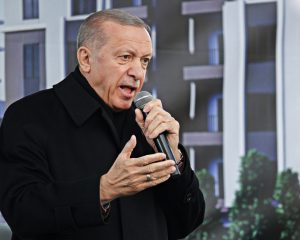BLOOMBERG
Turkish President Recep Tayyip Erdogan cancelled three scheduled campaign appearances less than a month before high-stakes elections after falling ill during a live television interview.
Broadcasting was disrupted for several minutes after Erdogan, 69, became sick with what he said was stomach flu.
In power for the past two decades, Erdogan has developed a reputation as a tireless strongman who rarely cancels events, so the sudden and public nature of the incident initially shocked viewers. But his aides have since said the president was in good health and would resume his regular schedule after taking a day’s rest.
Markets appeared relatively unperturbed by Wednesday’s open. The lira remained flat against the dollar, while Turkey’s benchmark stocks index was down slightly more than 1%.
Erdogan is facing his toughest election since taking power in 2003, with an alliance of six opposition parties joining forces to unseat him as Turks struggle with the worst cost-of-living crisis in two decades.
The opposition alliance has chosen Kemal Kilicdaroglu, 74, as its joint presidential contender in the May 14 vote. Kilicdaroglu wished Erdogan a quick recovery in a post on Twitter.
The cameras didn’t show Erdogan in the moments before the TV broadcast was interrupted, focussing instead on an interviewer asking a question. But microphones captured the concerned words of someone in the room saying, “oh no, oh no.†The comments were widely circulated on social media.
The programme had started 1.5 hours behind schedule without explanation. Erdogan said he’d considered cancelling the interview due to his “upset stomach.â€
“Due to my busy schedule, such issues can arise from time to time,†Erdogan said upon returning to the broadcast on Kanal 7 after several minutes. He answered one more question before the interview concluded.
After initially building a reputation as an economic hero, Erdogan began to accrue unchecked powers that critics say have undermined the country’s democratic foundations.
Erdogan’s foreign policy zigzags, including closer military ties with Russia, have created rifts with the West. Yet at the same time, Turkey, a Nato member and European Union aspirant, continues to wield enormous influence because of its position as a bridge between Europe and Asia.
 The Gulf Time Newspaper One of the finest business newspapers in the UAE brought to you by our professional writers and editors.
The Gulf Time Newspaper One of the finest business newspapers in the UAE brought to you by our professional writers and editors.
